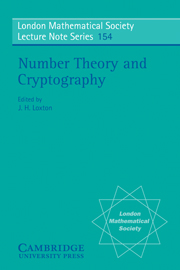Book contents
- Frontmatter
- Contents
- Contributors
- Introduction
- I NUMBER THEORETIC ASPECTS OF CRYPTOLOGY
- 1 Some mathematical aspects of recent advances in cryptology
- 2 Quadratic fields and cryptography
- 3 Parallel algorithms for integer factorisation
- 4 An open architecture number sieve
- 5 Algorithms for finite fields
- 6 Notes on continued fractions and recurrence sequences
- II CRYPTOGRAPHIC DEVICES AND APPLICATIONS
- PART III DIOPHANTINE ANALYSIS
1 - Some mathematical aspects of recent advances in cryptology
Published online by Cambridge University Press: 05 May 2013
- Frontmatter
- Contents
- Contributors
- Introduction
- I NUMBER THEORETIC ASPECTS OF CRYPTOLOGY
- 1 Some mathematical aspects of recent advances in cryptology
- 2 Quadratic fields and cryptography
- 3 Parallel algorithms for integer factorisation
- 4 An open architecture number sieve
- 5 Algorithms for finite fields
- 6 Notes on continued fractions and recurrence sequences
- II CRYPTOGRAPHIC DEVICES AND APPLICATIONS
- PART III DIOPHANTINE ANALYSIS
Summary
We report on some recent achievements in parts of cryptology: Wiener's attack on short secret RSA exponents, McCurley's composite Diffie and Hellman key distribution scheme, and Niederreiter's continued fraction tests for pseudorandom sequences. The topics are selected because of their emphasis on mathematical concepts such as continued fractions and discrete logarithms.
Introduction
Cryptology is a very active and expanding field tha t brings forward new developments in cryptography and crypt analysis every year. A comprehensive survey and up-to-date report (as of 1988) on the advances in designing ciphers and cryptographic schemes and on recent successes in breaking cryptosystems has been published in [18] as a collection of important papers on cryptology. This special section of the Proceedings of the IEEE, from May 1988, may serve th e interested reader as a first introduction to a variety of topics in contemporary cryptology, ranging from conventional cyptosystems and the Dat a Encryption Standard, over public-key cryptography and recent advances in crypt analysis, to a survey of information authentification. Brassard [1] gives a brief survey of cryptography, which is kept at the nontechnical level. Mathematical concepts in cryptography are emphasised in the books by van Tilborg [19], Patterson [13] and Lidl and Niederreiter [6]. For those interested in details of the design and analysis of ciphers, we refer to the proceedings volumes of the annual meetings EUROCRYPT and CRYPTO, see for example [3] and [14].
- Type
- Chapter
- Information
- Number Theory and Cryptography , pp. 1 - 8Publisher: Cambridge University PressPrint publication year: 1990



